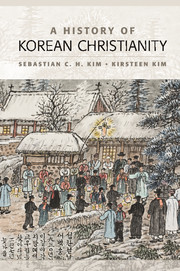Book contents
- Frontmatter
- Contents
- Illustrations
- Acknowledgements
- Abbreviations
- Maps
- Chapter 1 Introduction
- Chapter 2 Believers, Martyrs and Missionaries, 1592–1876
- Chapter 3 Evangelism, Patriotism and Revivalism, 1876–1910
- Chapter 4 Oppression, Resistance and Millennial Hope, 1910–1945
- Chapter 5 Liberation, Service and Divisions, 1945–1961
- Chapter 6 Growth, Thought and Struggle, 1961–1988
- Chapter 7 Missions, Reconciliation and Public Life, 1988–Present
- Glossary
- Bibliography
- Index
Chapter 7 - Missions, Reconciliation and Public Life, 1988–Present
Published online by Cambridge University Press: 05 March 2015
- Frontmatter
- Contents
- Illustrations
- Acknowledgements
- Abbreviations
- Maps
- Chapter 1 Introduction
- Chapter 2 Believers, Martyrs and Missionaries, 1592–1876
- Chapter 3 Evangelism, Patriotism and Revivalism, 1876–1910
- Chapter 4 Oppression, Resistance and Millennial Hope, 1910–1945
- Chapter 5 Liberation, Service and Divisions, 1945–1961
- Chapter 6 Growth, Thought and Struggle, 1961–1988
- Chapter 7 Missions, Reconciliation and Public Life, 1988–Present
- Glossary
- Bibliography
- Index
Summary
The year 1988 was a watershed in South Korea not only in its transition to democracy but also in its opening to the world as it hosted a highly successful Olympic Games. The 1988 games were the first occasion since 1976 that both the Americans and the Russians competed. The thaw in the Cold War enabled South Korea to establish diplomatic and economic links with Soviet and Eastern Bloc countries for the first time, while rebuffing North Korea’s efforts to co-host the games and thus isolating its neighbor. Hosting the games stimulated intense national pride in the South and great interest in other nations and cultures. There were a few concerns about the revival of Korean ‘pagan’ customs and culture for the opening ceremony, but most Christians welcomed the Olympics as confirmation of God’s blessing on Korea. In preparation for the games the Protestant churches held what was to be the last great mass evangelism event: the ’88 World Evangelization Crusade or ‘Soulympics’ on 15–18 August on Yoido Plaza. Although the total attendance was not the highest, the event surpassed all the others in its rhetoric about Korea as a chosen nation. With the world coming to Seoul, an outstanding opportunity for world evangelisation presented itself. Korea Sports Evangelism (founded in 1982) was responsible for the operation of the Protestant Chapel in the athletes’ village, which was attended by chaplains from all over the world and visited by thousands of athletes, including hundreds of Russians, Chinese and Arabic speakers. Furthermore, because of their familiarity with Western culture and the English language, and the exhortations of their pastors, many of the volunteers and interpreters for the Olympics were Christians who took the opportunity to share their faith and pass on literature. Local churches were matched to particular countries; some congregations attended events to cheer the competitors from those countries and even hosted entire teams (Cho Chong-nahm 1995).
- Type
- Chapter
- Information
- A History of Korean Christianity , pp. 263 - 316Publisher: Cambridge University PressPrint publication year: 2014



